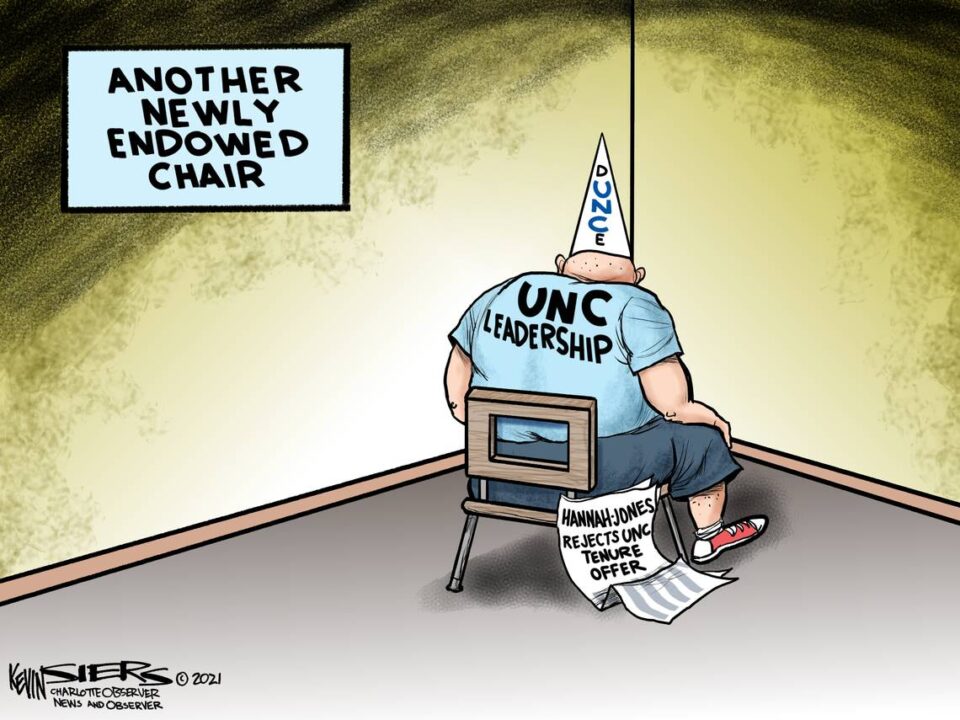Journalists Consider Own Self-Esteem Issues
. . . . Tucker Carlson Wants Cameras in Classroom
Prisons’ COVID Toll Higher Than Acknowledged
NABJ Wants Meeting With ESPN Over Nichols
U.S. Coverage of Haiti Called Part of the Problem
News of Graves Is Personal for Native Journalists
NPR Cites Insult to Indians in the Declaration
Osaka Asks for Changes in News Conferences
Cosby Ready to Perform, Blames Media for Jan. 6
CBS Names Green Its GM of N.Y. TV Outlets
An Ida B. Wells Moment in Chicago
Investigative Group Partners With D.C. Black Paper
Writer Revisits Capital ‘B’ for ‘Black’
Many Ex-Offenders Don’t Know They Can Vote
Short Takes
Support Journal-isms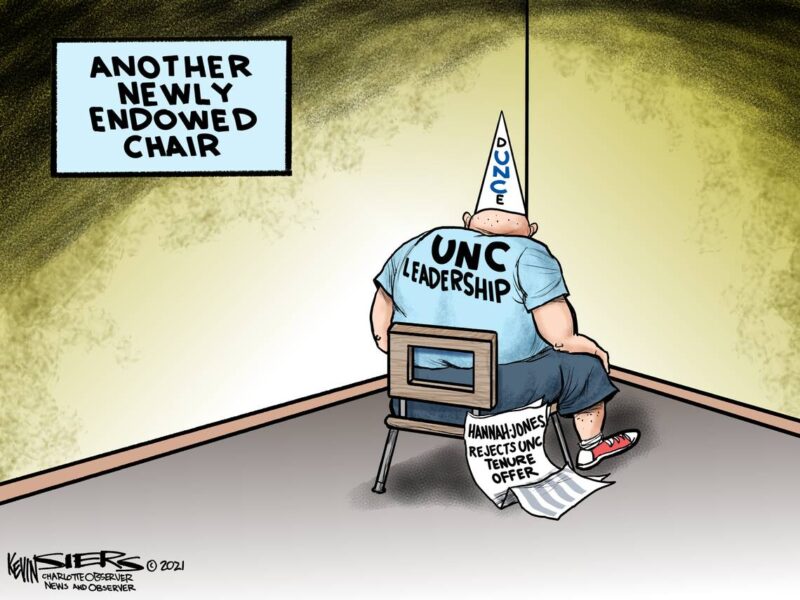
Journalists Consider Own Self-Esteem Issues
Nikole Hannah-Jones’ decision to spurn the University of North Carolina for Howard University is resonating with other journalists of color, with supporters of historically Black colleges and universities and with those who believe that UNC and others have surrendered too much of their authority to politicians and wealthy donors.
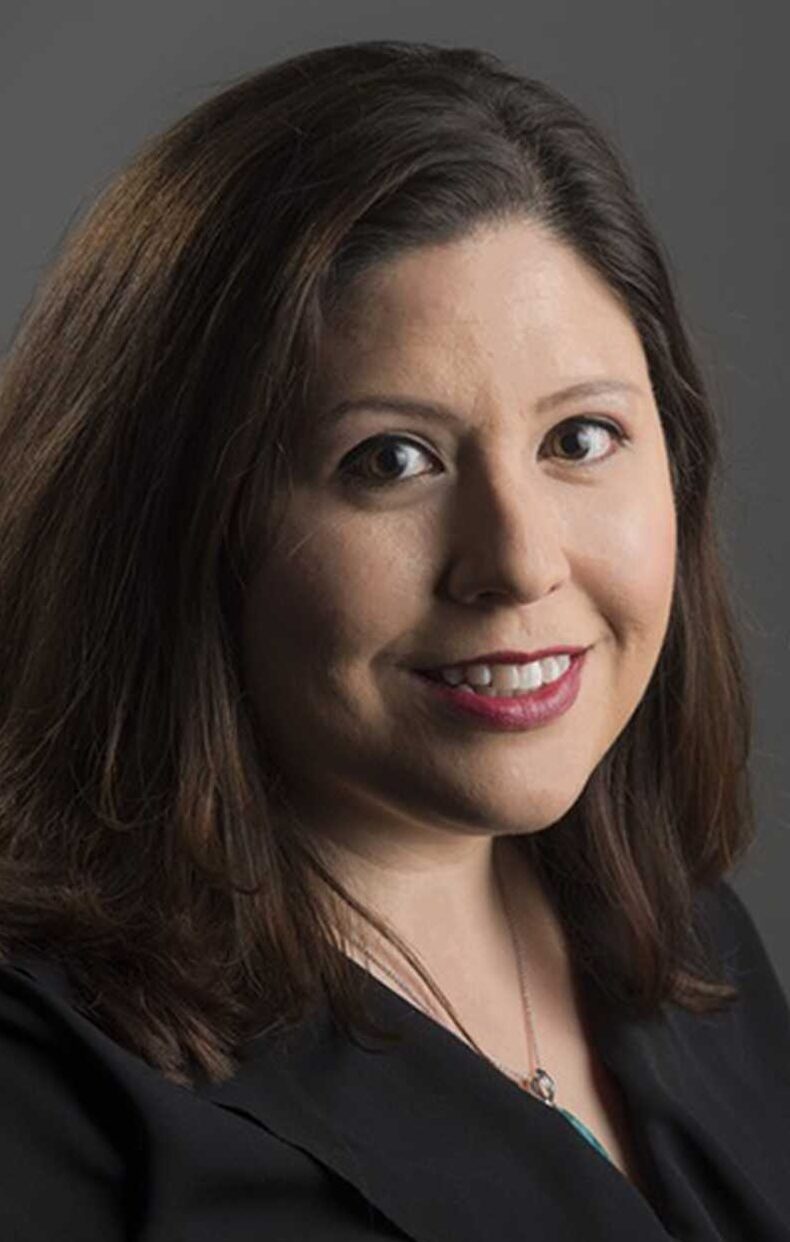 “I have been a journalist for nearly 20 years and have learned to advocate for myself and others,” Theresa Vargas (pictured) wrote Wednesday in her Washington Post column. “I trusted others to decide my worth. I felt confident in my reporting and writing skills, but deeply insecure when it came to fitting into an industry where not many people shared my background. The lack of diversity in journalism has been well documented, but looking at it in terms of numbers only shows who doesn’t exist. It doesn’t reveal what it means to stand in those low percentages.
“I have been a journalist for nearly 20 years and have learned to advocate for myself and others,” Theresa Vargas (pictured) wrote Wednesday in her Washington Post column. “I trusted others to decide my worth. I felt confident in my reporting and writing skills, but deeply insecure when it came to fitting into an industry where not many people shared my background. The lack of diversity in journalism has been well documented, but looking at it in terms of numbers only shows who doesn’t exist. It doesn’t reveal what it means to stand in those low percentages.
“It is lonely. It involves hiding parts of yourself, and then feeling angry that you did. It involves accepting that at times you will feel more connected to the parking garage staff than the people who wield the power to determine your future.”
Vargas said of Howard students, “They are learning that it’s not enough to just be allowed to sit at the table.
Nikole Hannah-Jones told MSNBC’s Joy Reid on Tuesday, “The tradition of doctors, lawyers, professionals coming out of HBCUs still, it’s an amazing tradition to be a part of. And we don’t need to feel that we have to get validation from these other institutions. We can come home and build our own.” (Credit: YouTube)
“They are learning that the burden of fixing broken systems shouldn’t fall to those who have been hurt most by that brokenness.
“They are learning that it’s okay to know — and declare — their worth.
“Now that we see what stealing a college slot really looks like, can we stop making students of color feel like frauds?”
A Post colleague, Karen Attiah, wrote Tuesday under the headline, “Nikole Hannah-Jones just dunked on UNC. But for Black journalists and educators, the game is still rigged.” “On the one hand, Hannah-Jones’s refusal to accept UNC’s scraps felt like a victory for every Black person who has been held back in White spaces.
“But the pain she speaks of is real and visceral. . . .”
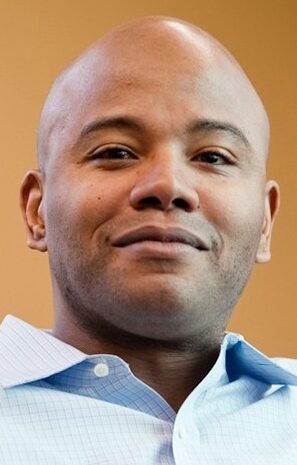 For cnn.com, Black scholar Peniel E. Joseph (pictured) shouted out Black institutions and scolded UNC. “The enduring power of Black institutions resides in their ability to recognize and amplify Black excellence, offering shelter in a time of political backlash and structural violence that has historically enveloped Black communities,” Joseph wrote.
For cnn.com, Black scholar Peniel E. Joseph (pictured) shouted out Black institutions and scolded UNC. “The enduring power of Black institutions resides in their ability to recognize and amplify Black excellence, offering shelter in a time of political backlash and structural violence that has historically enveloped Black communities,” Joseph wrote.
“These talented journalists, carrying forward the pioneering work of Frederick Douglass and Ida B. Wells, are particularly well suited to continue a longstanding tradition of challenging limited conceptions of American citizenship, identity and democracy that at once profits from Black genius and denies its existence.
“Perhaps the newly endowed Center for the Study of Journalism and Democracy at Howard University will inspire the University of North Carolina — and all other institutions of higher education under fire from conservatives for teaching Black History — to recommit themselves to the study and critical debate of uncomfortable truths. These truths — both the sacred and profane aspects of American history that threaten to divide the nation in our own time — offer the key to a new national consensus defined by who we include in our national narrative, rather than who is left out.”
The editorial board of the News & Observer in Raleigh weighed in on the controversy’s cost to UNC, noting that “attempts by conservative officeholders, appointees and donors to steer the university rightward are having a disastrous effect on UNC’s once shining reputation.
“Imposing political ideology on what is supposed to be a haven for free thinking is bad enough. The ideologues have compounded the damage with their incompetence, first with the fight over the removal of the Confederate statue known as Silent Sam and now with the bitter departure of a prominent Black journalist who is not silent about the racist currents that run through U.S. history.”
The Black Student Movement and the Carolina Black Caucus, which includes Black faculty and students, had already issued a lengthy and detailed list of needed changes after previous incidents.
“More reports, documents and letters from the UNC Black community that have been sent to the chancellor, trustees and other university leaders are available to view online,” Kate Murphy and Martha Quillin wrote Tuesday in the News & Observer.
- Lateshia Beachum, Washington Post: Nikole Hannah-Jones’s tenure saga highlights lack of Black journalism instructors, students say
- Max Brantley, Arkansas Times: UPDATE: Nikole Hannah-Jones declines job at University of North Carolina. Statement faults Democrat-Gazette publisher for his role.
- Max Brantley, Arkansas Times: Arkansas Democrat-Gazette publisher Walter Hussman: No regrets for his role in driving Nikole Hannah-Jones away from journalism school named for him
- Joel Brown, WTVD, Raleigh, N.C.: ‘Now, you see:’ Nikole Hannah-Jones’ UNC tenure battle hits home for some local Black academics
- Curtis Bunn, NBC News: ‘It’s a calling’: Why Black academics choose HBCUs over other colleges
- Paul Butler, Washington Post: Nikole Hannah-Jones just proved the correctness of critical race theory
- Editorial, News & Observer, Raleigh, N.C.: The lessons Nikole Hannah-Jones left for UNC
- Rick Edmonds, Poynter Institute: UNC donor says he has no regrets about his role in the journalism school losing Nikole Hannah-Jones
- Haleluya Hadero and Glenn Gamboa, Associated Press: Philanthropies eagerly back journalist Hannah-Jones
- Kristen Hare, Poynter Institute: The local reporter who broke the Nikole Hannah-Jones/UNC story also got her latest exclusive
- Mary Harris with Joe Killian, What Next, Slate: It Didn’t Start With Nikole Hannah-Jones (podcast)
- Panama Jackson, The Root: I’m Happy That Nikole Hannah-Jones and Ta-Nehisi Coates Are Going to Howard. Now, Howard Folks Get to Be More Insufferable. Yay
- Susan King: University of North Carolina: Special Update from Susan King
- Kate Murphy and Martha Quillin, News & Observer, Raleigh, N.C.:How Nikole Hannah-Jones and UNC’s Black community say school can begin to fix things
- Kate Murphy, News & Observer, Raleigh, N.C.: The three critical moments that gave Nikole Hannah-Jones the clarity to turn down UNC
- Kate Murphy and Dan Kane, News & Observer, Raleigh, N.C.: UNC-Chapel Hill police chief resigns without explanation. What’s next?
- Sophia A. Nelson, The Grio: Nikole Hannah-Jones’ Howard move teaches us how to fight with the tool of self-respect
. . . . Tucker Carlson Wants Cameras in Classroom
“Fox News host Tucker Carlson on Tuesday called for cameras to be installed in classrooms to monitor for teaching of critical race theory,” Tom Porter reported Wednesday for Business Insider.
Carlson said, “We can’t really be sure until we finally get cameras in the classroom, as we put them on the chests of police officers, until we finally get a civilian review board in every town in America to oversee the people teaching your children, forming their minds. And let’s hope we get both of those very soon. But until we do, we can’t know exactly how widespread this is.”
- Linda Borg, Providence Journal: General Assembly passes civics education, black history curriculum bills
- Kimberlé Crenshaw, Washington Post: The panic over critical race theory is an attempt to whitewash U.S. history (July 2)
- Daniel Cubias, MANO: What Racists Don’t Want Us to Know (July 1)
- Kmele Foster, David French, Jason Stanley and Thomas Chatterton Williams, New York Times: We Disagree on a Lot of Things. Except the Danger of Anti-Critical Race Theory Laws.
- Samuel Hoadley-Brill, Washington Post: Critical race theory’s opponents are sure it’s bad. Whatever it is.
- Julie Hollar, Fairness & Accuracy In Reporting: How Not to Cover Critical Race Theory
- National Conference of Black Lawyers, International Association of Democratic Lawyers, National Lawyers Guild: International Commission of Inquiry on Systemic Racist Police Violence against People of African Descent in the United States (April)
- Clarence Page, Chicago Tribune: Can the left defend critical race theory? Or merely oppose its critics? (July 2)
- Lis Power, Media Matters for America: Fox has mentioned “critical race theory” nearly 1,300 times in the past 3.5 months (June 15)
- Julia Carrie Wong, The Guardian: From viral videos to Fox News: how rightwing media fueled the critical race theory panic
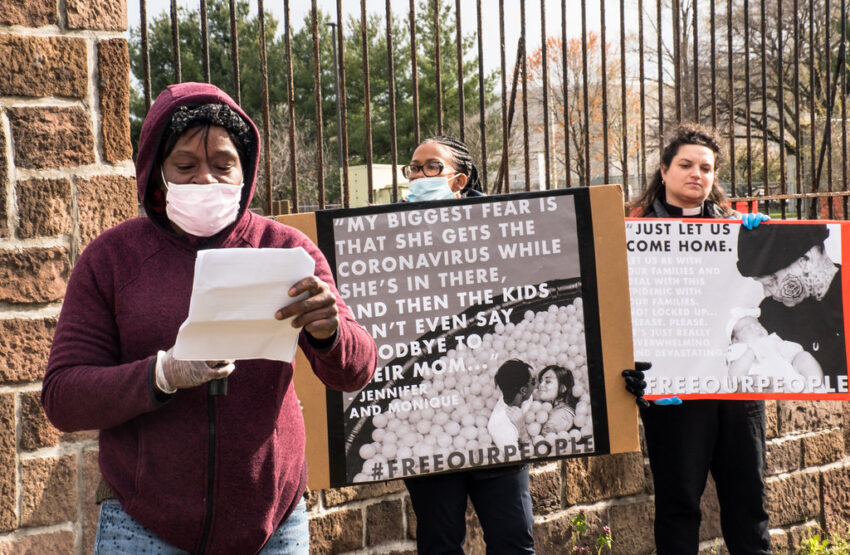
Prisons’ COVID Toll Higher Than Acknowleged
“For 15 months, The Marshall Project and The Associated Press tracked the spread of COVID-19 through prisons nationwide,” Katie Park, Keri Blakinger and Claudia Lauer reported, with others, on June 30 for the Marshall Project.
“We counted more than a half-million people living and working in prisons who got sick from the coronavirus. Prisons were forced to adapt to unusual and deadly circumstances. But now, as new cases are declining and facilities are loosening restrictions, there’s little evidence to suggest enough substantive changes have been made to handle future waves of infection.
“With crowded conditions, notoriously substandard medical care and constantly shifting populations, prisons were ill-equipped to handle the highly contagious virus, which killed nearly 3,000 prisoners and staff.”
Separately, Maura Turcotte, Rachel Sherman, Rebecca Griesbach and Ann Hinga Klein of The New York Times reported Wednesday, “The New York Times identified dozens” of prisoners who died of COVID “but were not included in official counts.”
The Marshall Project-Associated Press team also wrote, ” The Justice Department’s inspector general found that at some facilities, like FCC Oakdale in Louisiana, which emerged as an early hotspot, those who tested positive for the virus were left in their housing units for days without being isolated. . . . Even when state and federal prisons did conduct tests, they still allowed prisoners who tested positive to come in contact with others. . . .”
- Journal-isms: Why Prisons Deserve More Coverage (June 7, 2020)
“Jemele Hill joins Dan Le Batard, [Jon] Stugotz and Amin Elhassan to discuss Rachel Nichols’ comments about Maria Taylor, NBA Countdown and the larger role ESPN plays in all of this. “ (video)
NABJ Wants Meeting With ESPN Over Nichols
“The National Association of Black Journalists [is] demanding a meeting with top ESPN and Disney brass in the wake of Rachel Nichols’ comments regarding Maria Taylor in 2020, where Nichols, who is white, suggested Taylor was picked over her to cover last year’s NBA Finals because she is Black,” Tim Baysinger reported Wednesday for The Wrap.
“ ‘The NABJ Board of Directors is disturbed to learn the details of this situation and what appeared to be a lack of accountability and a desire by ESPN to provide accommodations for a white employee who mocked diversity and a well-qualified co-worker while seemingly ignoring how Taylor and others who later heard the conversation may have been affected,’ said NABJ president Dorothy Tucker.
” ‘The silence and apparent inaction by ESPN leaders over the last year is deafening and, as a result, NABJ is requesting a meeting with Bob Iger, executive chairman at The Walt Disney Company, which owns ESPN; Bob Chapek, CEO of The Walt Disney Company; and Jimmy Pitaro, chairman of ESPN.’
“Following the uproar over Nichols comments, which were rehashed over the weekend in a New York Times story that examined the internal fallout at ESPN, Nichols was left off of NBA Finals coverage, for which she . . . previously served as the sideline reporter. On Monday during her show ‘The Jump,’ Nichols apologized to Taylor and her colleagues. . . .”
- Andrew Marchand, New York Post: ESPN’s $3 million offer to Maria Taylor may not let her finish NBA Finals
- Jay Mariotti, Barrett Sports Media: In Any Meritocracy, Maria Taylor Is No Rachel Nichols
- National Association of Black Journalists: NABJ Calls for Meeting with Disney Heads After Treatment of ESPN’s Maria Taylor Reveals Toxic Culture of Bias
- Jason Owens, Yahoo: Maria Taylor tweets about ‘dark times’ in first public comments addressing ESPN’s Rachel Nichols fallout
- Iliana Limón Romero, Los Angeles Times: “This isn’t about Maria vs. Rachel:” ESPN must address pervasive race problems
- Ben Strauss, Washington Post: Rachel Nichols is back on the air, but the fallout at ESPN is just beginning
- Rafia Zakaria, CNN: Rachel Nichols’ words confirm the fears faced by women of color
slaves paying reparations to the enslavers?!? it happened in Haiti. at 2:24 below @vladduthiersCBS breaks down this infuriating history and how it connects to today. https://t.co/MLy096U93G
— Jesse Washington (@jessewashington) July 8, 2021
U.S. Coverage of Haiti Called Part of the Problem
The day after assailants assassinated Haitian President Jovenel Moïse Tuesday night, Widlore Mérancourt, the editor of the Haitian news outlet AyiboPost, told Marco Werman of PRI’s “The World” of the danger journalists have faced in his country.
“During the situation, gangs were controlling large swaths of Haiti. Last week, for instance, 20 people were killed, including a high-profile opponent and a Haitian journalist; about five journalists were killed during his tenure . . .” (audio)
That’s just the beginning of the concerns journalists should have, Jon Allsop wrote Friday in Columbia Journalism Review. Members of the media should also be thinking about the coverage that Haiti receives in the United States, and whether it is stereotypical and contributes to the turmoil, Allsop wrote.
“Robert Taber, a history professor at Fayetteville State University who is working on a book about Haiti, wrote, in the Washington Post, that US readers tend to view the country as ‘a tropical tapestry for tales of dictators and political dysfunction, of poverty and adversity, of stories and tropes that exist in an ever-present now.‘
“But ‘these stereotypes are steeped in anti-Black racism and mask an important truth: the histories of Haiti and the United States are intertwined and reach back centuries.’ The media, Taber continued, has long been central to shaping perceptions of Haiti, and complicit in the distortions: in colonial times, French slave owners would exchange newspapers with cities along the Eastern Seaboard; after the Revolution, early American publications twisted the story of Black Haitians’ fight for independence, fearing that the truth might encourage Black emancipation back home. Since then, coverage of Haiti has been intermittent, tending to rise and fall with the US government’s involvement.”
Allsop also wrote, “Similar tropes have come up in the coverage of Moïse’s murder: passive references to ‘chaos’ and ‘turmoil,’ often eliding the complex story of his rule, as well as Haiti’s history. In some quarters, the US has been cast, once again, as a savior. . . .
“Other writers who have lived and worked in Haiti argue that Western coverage of Moïse’s murder needs to become more critical. ‘I am here to tell you, my colleagues in the English-language media, that you’re not asking enough questions about what happened,’ Susana Ferreira, a former Reuters correspondent, tweeted. ‘That’s what the “poorest country”/”basketcase of the Western hemisphere” line does: it keeps you from asking questions. And Haitians deserve those questions, at the very very least.’ ”
- Sam Bojarski, Haitian Times: Diaspora laments assassination, calls for answers and direction
- Jacqueline Charles, Miami Herald: Colombians’ arrest highlights growing presence of private military contractors in Haiti
- Committee to Protect Journalists: Haitian journalist Diego Charles shot and killed in Port-au-Prince
- Editorial, Miami Herald: The shocking assassination of Haiti’s president means U.S. must get off the sidelines and act
- Larisa Karr, Haitian Times: ICYMI: Eight things to know about the Moïse [assassination] so far in Haiti
- Mamyrah Prosper in Haiti with Jared Ball and Kamau Franklin, “The RemiX Morning Show” (podcast, segment starting at 1:21:45)
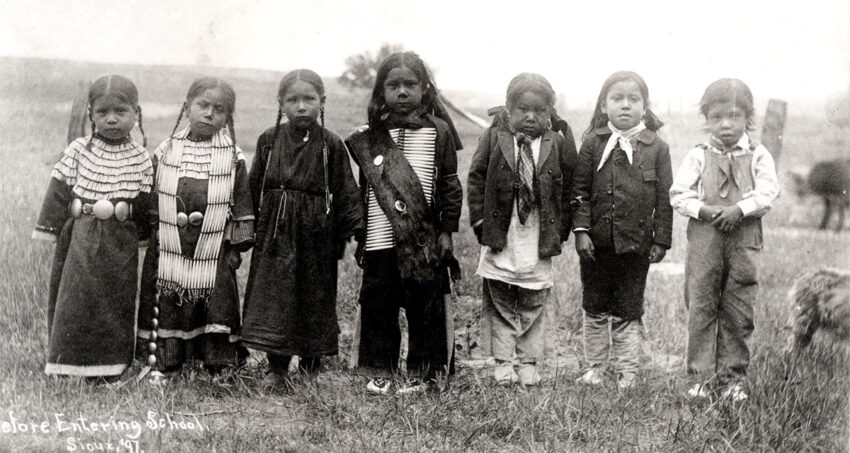
News of Graves Is Personal for Native Journalists
“The world was shocked to hear about the discovery of the unmarked graves of 215 children at the Kamloops Indian Residential School in British, Columbia Canada,” Mary Annette Pember, Ojibwe, wrote Tuesday for Indian Country Today.
“For many Indigenous people, however, the most shocking element of the story is not the discovery of the graves but the fact that it’s taken so long for non-Natives to acknowledge the grim details of this long-ignored history of Indian boarding and residential schools, a story that is part of both U.S. and Canadian history.
“Moreover, the news in Canada begs the question: Are there similar burial sites at U.S. Indian boarding schools? . . .”
Pember messaged Journal-isms, “my mother was a boarding school survivor; I’ve been writing about it for quite awhile. Most Native folks have some sort of boarding school story in their families.”
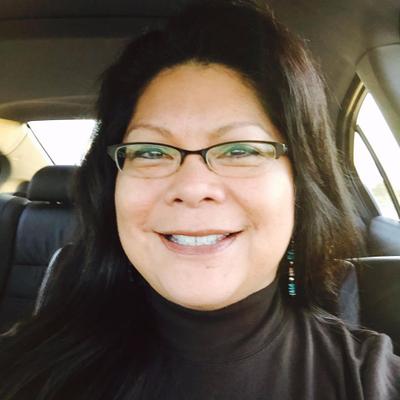 Patty Talahongva (pictured), Hopi, is executive producer at IndianCountryToday.com and a past president of the Native American Journalists Association.
Patty Talahongva (pictured), Hopi, is executive producer at IndianCountryToday.com and a past president of the Native American Journalists Association.
She wrote Wednesday on Facebook, “I am a third generation boarding school survivor. My grandparents were taken by force from their parents. By the time my parents were born it had become normalized! I went to the Phoenix Indian School because my tribe did not have a junior or senior high school on the reservation. That’s how ‘normal’ it was to be sent off to one of these government boarding schools. However, the schools also changed and by the 40s they weren’t so militarized.
“Still, growing up without the love and support of your parents causes a lifetime of issues. Hence, historical trauma. We are all trying to heal and not pass on horrible behavior that was learned in these boarding schools. All this news and reactions by the majority who have never heard of government run boarding schools is creating stress for many of us. Please, read and educate yourselves and demand your schools teach this horrific history! Check out the boarding school exhibit at the Heard Museum. It’s on-line. Eskweli!
- Emma Ascott, Cronkite News: Enduring Trauma
- Negiel Bigpond and Sam Brownback, Washington Post: It’s long past time for our country to apologize publicly for what it did to Native people
- Amanda Coletta, Washington Post: Remains of 215 Indigenous children discovered at former Canadian residential school site (May 28)
- Jeff Gammage, Philadelphia Inquirer: Rosebud Sioux to receive the remains of their children who died at the former Carlisle Indian School (June 26)
- James Peters, CFJC Today, Kamloops, British Columbia: Tk’emlups confirms bodies of 215 children buried at former Kamloops Indian Residential School site (May 27)
- Sonia M. Rosa, American Taino: The Porto Rican Indians of the Carlisle School (2007)
- Brett Sholtis, WITF, Harrisburg, Pa.: Remains of students at Carlisle Indian School returned to families (July 11, 2019) (audio)
NPR Cites Insult to Indians in the Declaration
“Over the past 32 years, Morning Edition has broadcast a reading of the Declaration of Independence by NPR staff as a way of marking Independence Day,” an NPR announcer told listeners on July 2.
“But after last summer’s protests and our national reckoning on race, the words in the document land differently. . . .
“It famously declares ‘that all men are created equal’ even though women, enslaved people and Indigenous Americans were not held as equal at the time.
“What then follows is a long list of grievances and charges against King George III that outline the 13 North American British Colonies’ intentions to separate from Great Britain.
“The list, originally written largely by Thomas Jefferson, was edited by the Continental Congress. . . .
“But a racist slur about Native Americans stayed in.
“The passage charges that King George III ‘excited domestic insurrections’ among the colonists by Native Americans, who the founding document called ‘merciless Indian Savages.’
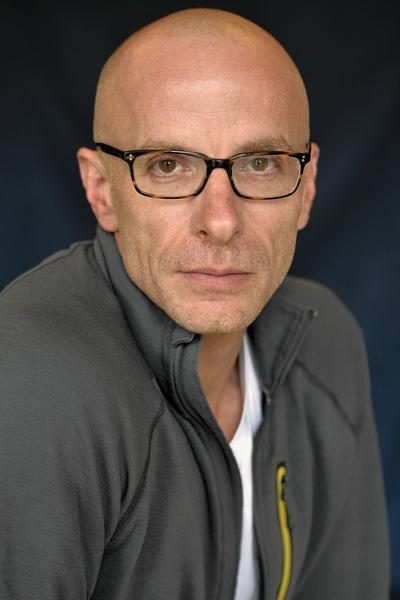 “Author David Treuer (pictured), who is Ojibwe from the Leech Lake Reservation, explains that this particular grievance refers to the idea that the British were, he says, ginning up discontent among Native people.
“Author David Treuer (pictured), who is Ojibwe from the Leech Lake Reservation, explains that this particular grievance refers to the idea that the British were, he says, ginning up discontent among Native people.
“But a deeper look at history also shows that one of the reasons why the colonists wanted to rise up against the British — and wage the Revolutionary War — was over the question of who would try to colonize Native lands west of the colonies, Treuer tells Morning Edition. ‘The crown wanted that money for themselves. The colonists, understandably, would have preferred to have it for themselves. So the whole revolution was in large part fought over who got to take our stuff,’ he says.
“He also notes that Native people helped the colonists in the Revolutionary War. ‘It was the Oneida people who broke the famine at Valley Forge, who taught the revolutionaries with George Washington, how to process Indian corn so that it was digestible and nutritious,’ he says. ‘So I think it’s safe to say that war would been difficult to win without our help.’ . . .”
- Carly Roman, Washington Examiner: Right calls to ‘defund NPR’ after it said the Declaration of Independence had ‘flaws and deeply ingrained hypocrisies’
Osaka Asks for Changes in News Conferences
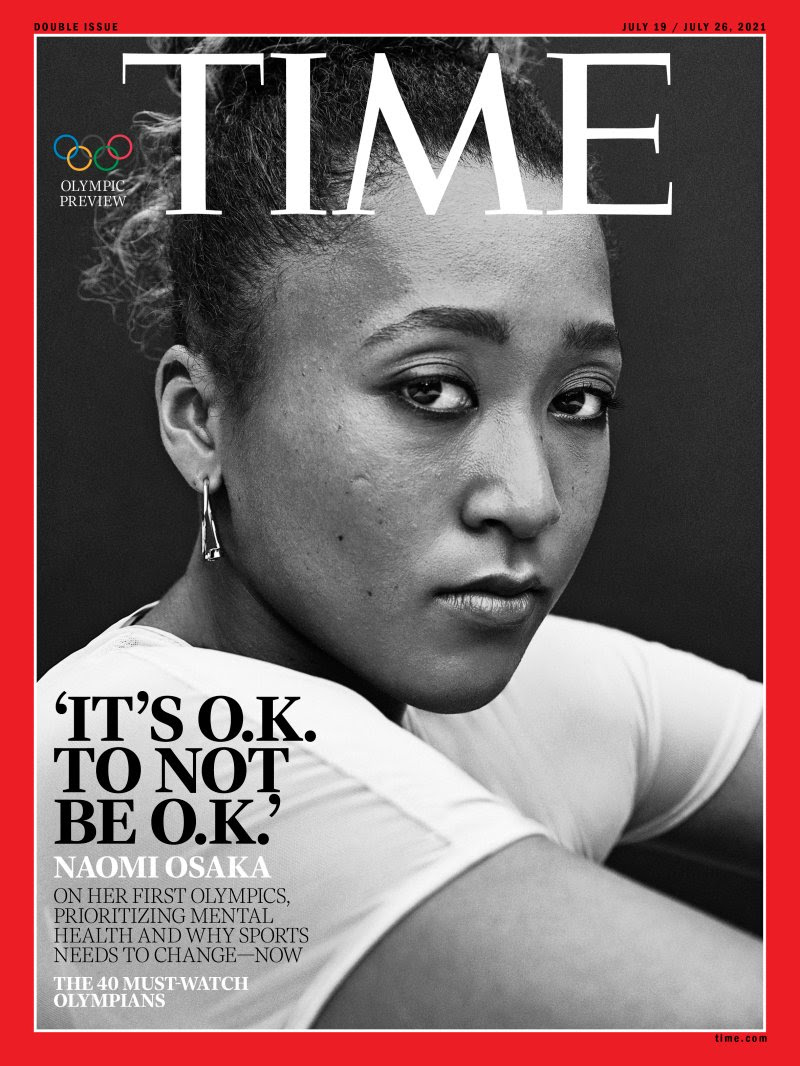 In “my opinion (and I want to say that this is just my opinion and not that of every tennis player on tour), the press-conference format itself is out of date and in great need of a refresh,” Naomi Osaka, who withdrew from the French Open and a traditional press conference to tend to her mental health, wrote Thursday for Time. “I believe that we can make it better, more interesting and more enjoyable for each side. Less subject vs. object; more peer to peer.”
In “my opinion (and I want to say that this is just my opinion and not that of every tennis player on tour), the press-conference format itself is out of date and in great need of a refresh,” Naomi Osaka, who withdrew from the French Open and a traditional press conference to tend to her mental health, wrote Thursday for Time. “I believe that we can make it better, more interesting and more enjoyable for each side. Less subject vs. object; more peer to peer.”
Osaka also wrote, “Perhaps we should give athletes the right to take a mental break from media scrutiny on a rare occasion without being subject to strict sanctions.
- Russell Leung, AsAmNews: Netflix releases trailer for Naomi Osaka docuseries
- Ben Smith, New York Times: Naomi Osaka Is Talking to the Media Again, but on Her Own Terms
- Darralyn Buford, Rolling Out: Stephen A. Smith opens up about depression following Naomi Osaka controversy (June 4)
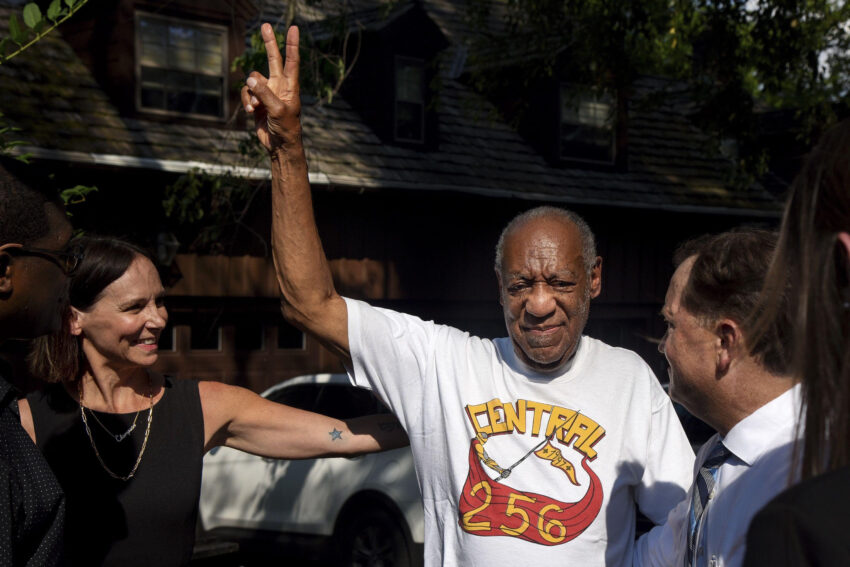
Cosby Ready to Perform, Blames Media for Jan. 6
“Get ready, because the kickoff of Bill Cosby’s Media Redemption Tour is coming ’round the bend in the wake of his overturned conviction and abrupt release from prison,” Melanie McFarland wrote July 1 for Salon. “Who knows which outlet will be the opening venue or which interviewer will serve as the emcee? Not I. But trust me when I say broadcast and cable TV newsrooms are probably falling all over themselves to book him as I type this.”
Meanwhile, “If anyone thought a now-free Bill Cosby was going to lay low for a bit after having his rape conviction and sentence suddenly overturned last week, think again . . .,” Dominic Patten wrote July 4 for Deadline.
“In a somewhat confusing, scattered statement today, Cosby lashed out at Howard University’s rebuke of his former on-air spouse Phylicia Rashad after her enthusiasm at the disgraced actor’s release from prison. Going from bad to worse, Cosby also decried the bloody attempted coup at the Capitol in January as the fault of the mainstream media, and not MAGA morons. It was not a good look, to put it mildly, for the 83-year-old once legally labeled ‘sexually violent predator.’ . . . ”
- Editorial, Los Angeles Times: Bill Cosby may well be a predator. But here’s why releasing him was the right move (July 1)
- Lisa Respers France, CNN: Phylicia Rashad’s support of Bill Cosby highlights division in the Black community (July 1)
- Renée Graham, Boston Globe: Black America deserves justice. Bill Cosby’s release from prison isn’t it. (July 1)
- Hollywood Reporter: TV Networks Face Moral Dilemma Whether to Interview Bill Cosby or Not (video)
- Suzette Hackney, USA Today: Bill Cosby may be out of prison, but we know who he is – and it’s not ‘America’s dad’ (June 30)
- Howard Kurtz, Fox News: How can Cosby walk free? (July 4)
- Crystal Marie, The Root: It Hurts When It’s One of Your Own (July 1)
- Tony Norman, Pittsburgh Post-Gazette: Cosby is free in the eyes of the law, but guilty everywhere else (July 2)
- Lonnae O’Neal, The Undefeated: Bill Cosby’s crimes illuminate the fault lines between generations of Black women (July 2)
- Clarence Page, Chicago Tribune: Race, gender blame game won’t save Bill Cosby or Mayor Lori Lightfoot (July 2)
- Eugene Robinson, Washington Post: Cosby no longer lives in prison, but he will always live in shame (July 1)
- Jeremy Roebuck and Laura McCrystal, Philadelphia Inquirer: Bill Cosby’s release from prison hinged on Bruce Castor’s word. But the ex-DA hasn’t always been consistent. (July 2)
- Jamie Davis Smith, Philadelphia Inquirer: Bill Cosby is not, and never will be, a Central High alum (July 1)
- Thameka Thompson, The Grio: Why Phylicia Rashad’s statement on Cosby was dangerous and revictimizing (July 1)
- Helen Ubiñas, Philadelphia Inquirer: Why Phylicia Rashad’s latest Bill Cosby defense is another example of women not believing women (July 1)
CBS Names Green Its GM of N.Y. TV Outlets
“CBS named a new leader for its flagship WCBS-TV station in New York, another sign that the broadcast giant is committed to improving working conditions within the company’s television stations group,” Meg James reported Wednesday for the Los Angeles Times.
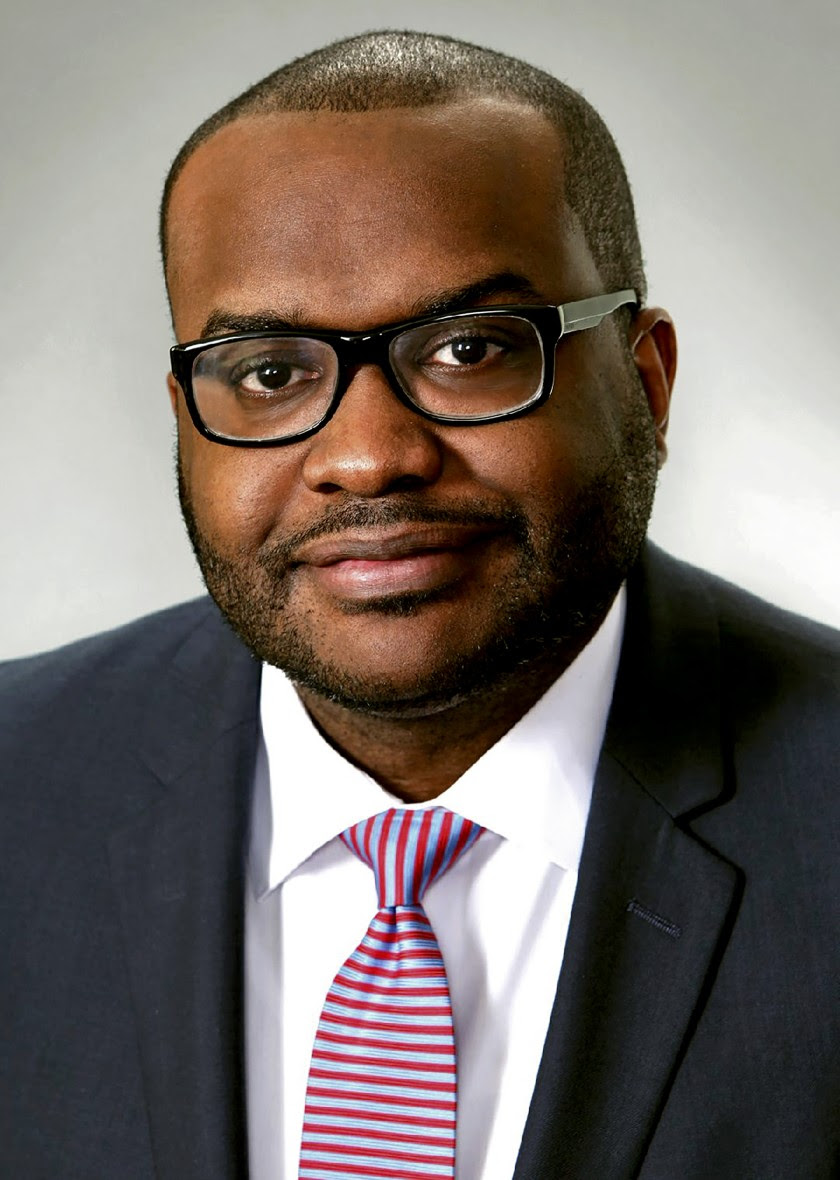 “The company announced Tuesday that it was promoting award-winning journalist Johnny Green Jr. (pictured) to president and general manager of CBS’ local operations in New York — television stations WCBS-TV Channel 2, WLNY-TV Channel 10/55 and its digital operation, CBSN New York.
“The company announced Tuesday that it was promoting award-winning journalist Johnny Green Jr. (pictured) to president and general manager of CBS’ local operations in New York — television stations WCBS-TV Channel 2, WLNY-TV Channel 10/55 and its digital operation, CBSN New York.
“Green, who is based in New York, had been running the joint WCBS-WLNY newsroom on an interim basis since late January, when CBS suspended two top executives in the wake of a Los Angeles Times investigation. Green was brought in to oversee WCBS’ news operations following allegations that the WCBS newsroom was a ‘hostile environment’ where Black, Latino, Asian and gay employees were treated poorly, and stories that occurred in Black and Latino neighborhoods were at times overlooked. . . .”
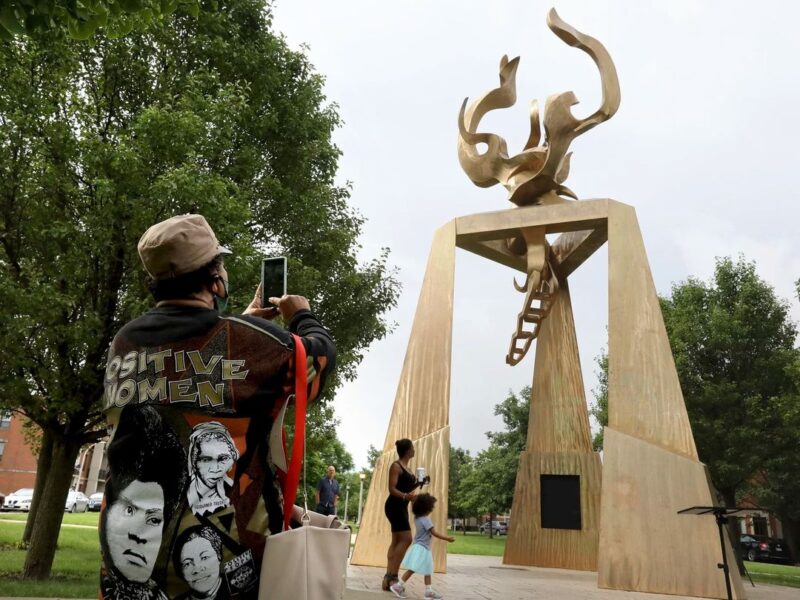
An Ida B. Wells Moment in Chicago
“The Ida B. Wells Monument was unveiled Wednesday at 37th & Langley among a crowd of spectators, public officials, Bronzeville, and former Ida B. Wells Home residents,” Tammy Gibson reported July 2 for the Chicago Defender.
“The 20-foot-tall sculpture ‘Light of Truth’ was designed by Chicago artist and sculptor Richard Hunt. The monument has three bronze columns, with spirals, coils, Ida B. Wells biographical facts, and one of her famous quotes, ‘The way to right wrongs is to turn the light of truth upon them.’ The monument is the first in the City of Chicago to honor a black woman. . . .”
Investigative Group Partners With D.C. Black Paper
 The Washington Informer, a member of the Black press, is partnering with the investigative Center for Public Integrity in “a year-long journalism study to determine the factors causing Black and low-income residents, including seniors, in Wards 7 and 8 to lose their homes,” the publication announced in an email to readers Wednesday.
The Washington Informer, a member of the Black press, is partnering with the investigative Center for Public Integrity in “a year-long journalism study to determine the factors causing Black and low-income residents, including seniors, in Wards 7 and 8 to lose their homes,” the publication announced in an email to readers Wednesday.
“Why are some neighborhoods targeted to gentrify, and what are the long-term adverse effects of gentrification on building and sustaining wealth for Black D.C. residents?
“Residents in Wards 7 and 8 have watched economic and housing growth across the city, and they are bracing themselves for a shift that is storming its way to their doorsteps.” Those wards are notable for their higher percentage of working class Blacks and are more often referred to as “forgotten” parts of the city.
Matt DiRienzo, editor in chief of the Center, messaged Journal-isms, “It’s really about service to their audience, so most to all of what will be produced for the project will live on their site. . . . we’re excited about it.”
- Journal-isms: Can the Black Press Help Save White Newspapers? (Sept. 21, 2020)
- News Media Alliance: Tips for Successful News Publishing Partnerships (April 15) (photo)
Writer Revisits Capital ‘B’ for ‘Black’
Juliette Harris, identified by the Poynter Institute as an independent editor and writer, revisits the decision by many news organizations last year to capitalize the “B” in “Black” when referring to people.
“The ‘who identify as Black’ clause in The Associated Press’ rationale is problematic because most people in Africa and the African diaspora formally identify by ethnicity and/or nationality, not as uppercase Black,” Harris wrote Thursday.
 “Black scholars and other professional black writers who retain lowercase black style are keenly aware of the sense of formal identity, pride and solidarity that uppercase black implies. They feel this sensitivity and still have specific reasons for their own lowercase usage. Some also are concerned about the pervasive standardization of uppercase black style.
“Black scholars and other professional black writers who retain lowercase black style are keenly aware of the sense of formal identity, pride and solidarity that uppercase black implies. They feel this sensitivity and still have specific reasons for their own lowercase usage. Some also are concerned about the pervasive standardization of uppercase black style.
“Blanket standardization obliterates the nuanced nature of black identities and assigns them to an official catch-all category.
“The ‘shared history and culture’ rationales for capping black overreach because the black peoples (plural) of the world do not share more history and culture than white peoples. The Melanesians (black people) of the South Pacific and the black people of Halifax, Nova Scotia, are as historically and culturally different as white Mississippians and the people of the Russian steppes. . . .”
Many Ex-Offenders Don’t Know They Can Vote
“As of 2020, millions of formerly incarcerated people in 13 states had recovered their right to vote,” Andrew R. Calderón wrote July 1 for the Marshall Project.
He also wrote, “We found that no more than 1 in 4 formerly incarcerated voters had registered to vote in the recent election, in four key states where we were able to obtain voter registration records along with some form of release records. Compare that to the general population, where 3 in 4 eligible voters registered to vote.
“We initially thought the story was about formerly incarcerated people who turned out to vote in the most recent election. The story that emerged from the analysis was about the barriers to registration. We saw low numbers of registrants in our data analysis, and as we spoke to organizers about it, we repeatedly heard about newly eligible voters being unaware their rights had been restored. . . .”
- Charles M. Blow, New York Times: Altering Our Vision of Voting (June 30)
- John Echohawk and Jacqueline De León, Washington Post: Native voters are clearing hurdles. That’s why some politicians want to make them higher.
Short Takes
- Zaila Avant-garde, a 14-year-old eighth grader from Harvey, Louisiana, smiled and twirled her way to the 2021 Scripps National Spelling Bee championship Thursday, becoming the first African-American winner in the spelling competition’s 96-year history, and the second Black champion ever following Jamaican-born Jody Anne-Maxwell’s win in 1998, Kylie Marr reported Friday for Yahoo.
- “The Center for Media Engagement partnered with the Dallas Free Press to explore how Dallas residents — particularly those in the disinvested neighborhoods of West Dallas and South Dallas — perceive local media and how they think that media can better serve their communities,” Gina M. Masullo and Marley Duchovnay wrote for the center, based at the University of Texas at Austin. “Those participating in the study generally felt that news coverage of their communities was lacking, did not accurately represent the area, and did not meet expectations. These findings helped reveal four approaches journalists anywhere can take to help bridge the divide between the media and local residents. . . .”
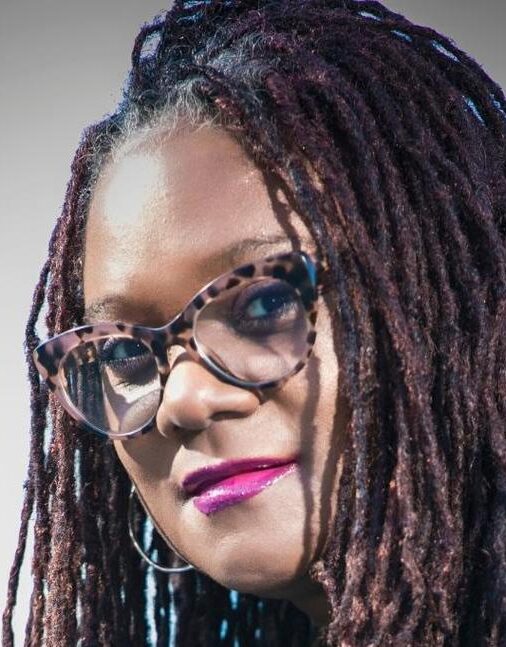 Deborah D. Douglas (pictured), a former Chicago Sun-Times editor who was Eugene S. Pulliam Distinguished Visiting Professor of Journalism at DePauw University; senior leader at The OpEd Project, which amplifies underrepresented expert voices; and managing editor of MLK50: Justice Through Journalism; joins Amber Payne as co-editor of The Emancipator, the new collaboration between antiracism leader Ibram Kendi and the Boston Globe.
Deborah D. Douglas (pictured), a former Chicago Sun-Times editor who was Eugene S. Pulliam Distinguished Visiting Professor of Journalism at DePauw University; senior leader at The OpEd Project, which amplifies underrepresented expert voices; and managing editor of MLK50: Justice Through Journalism; joins Amber Payne as co-editor of The Emancipator, the new collaboration between antiracism leader Ibram Kendi and the Boston Globe.
- In New Orleans, “former WWL-TV anchor Sally-Ann Roberts will take over as host of The Good Morning Show,” WWL reported Thursday. The station, co-owned by actor Wendell Pierce, reported that the current host , Oliver Thomas, “is stepping away to run for a seat on the New Orleans City Council.” Roberts, sister of “Good Morning America’s” Robin Roberts, retired from the Eyewitness Morning News in 2018 after 40 years as one of southeast Louisiana’s most beloved and respected television journalists.”
- “More than 24% of Latinos identify as Black,” Cristina Silva, deputy managing editor for enterprise at USA Today, tweeted on Thursday. “But you see very few Black Latinos in our newsrooms or in support groups for Latino journalists. A group of us are working to set up mentoring programs and more for Afro-Latinos journalists. If you want to help, please DM me.”
 “Effective July 1, Liz Llorente (pictured), an award-winning editor and reporter who has covered health care, immigration and politics for outlets ranging from The Record to Fox News Latino, joins our staff as our statewide expert on health care in underserved communities,” Jeff Roberts wrote for NJ.com. “She will concentrate on the systemic issues facing the vulnerable, write personal stories about the underserved and expose health disparities facing those in need. Llorente is more than just a journalist. A Union City native, she grew up in the city’s rich Cuban community. And she has raised two children in Bergen County. This is more than a job for her. This is home. . . .”
“Effective July 1, Liz Llorente (pictured), an award-winning editor and reporter who has covered health care, immigration and politics for outlets ranging from The Record to Fox News Latino, joins our staff as our statewide expert on health care in underserved communities,” Jeff Roberts wrote for NJ.com. “She will concentrate on the systemic issues facing the vulnerable, write personal stories about the underserved and expose health disparities facing those in need. Llorente is more than just a journalist. A Union City native, she grew up in the city’s rich Cuban community. And she has raised two children in Bergen County. This is more than a job for her. This is home. . . .”
- “The University of Missouri School of Journalism announced today a $1.4 million, three-year grant from the Walton Family Foundation, a leading funder of environmental journalism in the United States, to create the Mississippi River Basin Ag & Water Desk — a collaborative network of journalists focused on increasing coverage of agriculture, water and environmental issues surrounding one of the world’s major river systems,” the school said Thursday. . . . Through a partnership with Report for America, the network will place 10 journalists in newsrooms throughout the region to cover these issues. The journalists will receive training and mentorship from faculty and staff at the Missouri School of Journalism, along with experts from the Society of Environmental Journalists (SEJ). . . .”
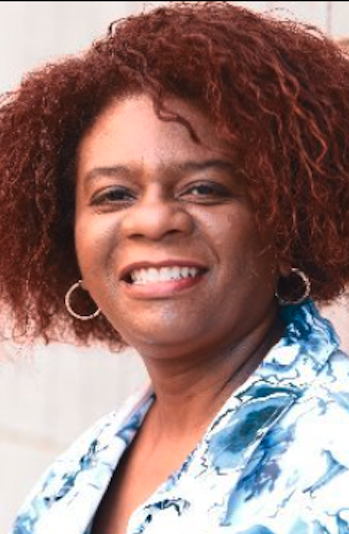 Francine Huff (pictured), most recently Knight Chair for Student Achievement at Florida A&M University, has been named director of journalism school partnerships for the Solutions Journalism Network, the organization announced Wednesday. “Her 25 years of newsroom and editorial business experience include bureau chief at the Wall Street Journal and editor and reporter at the Boston Globe, Pittsburgh Press and Valley News Dispatch.”
Francine Huff (pictured), most recently Knight Chair for Student Achievement at Florida A&M University, has been named director of journalism school partnerships for the Solutions Journalism Network, the organization announced Wednesday. “Her 25 years of newsroom and editorial business experience include bureau chief at the Wall Street Journal and editor and reporter at the Boston Globe, Pittsburgh Press and Valley News Dispatch.”
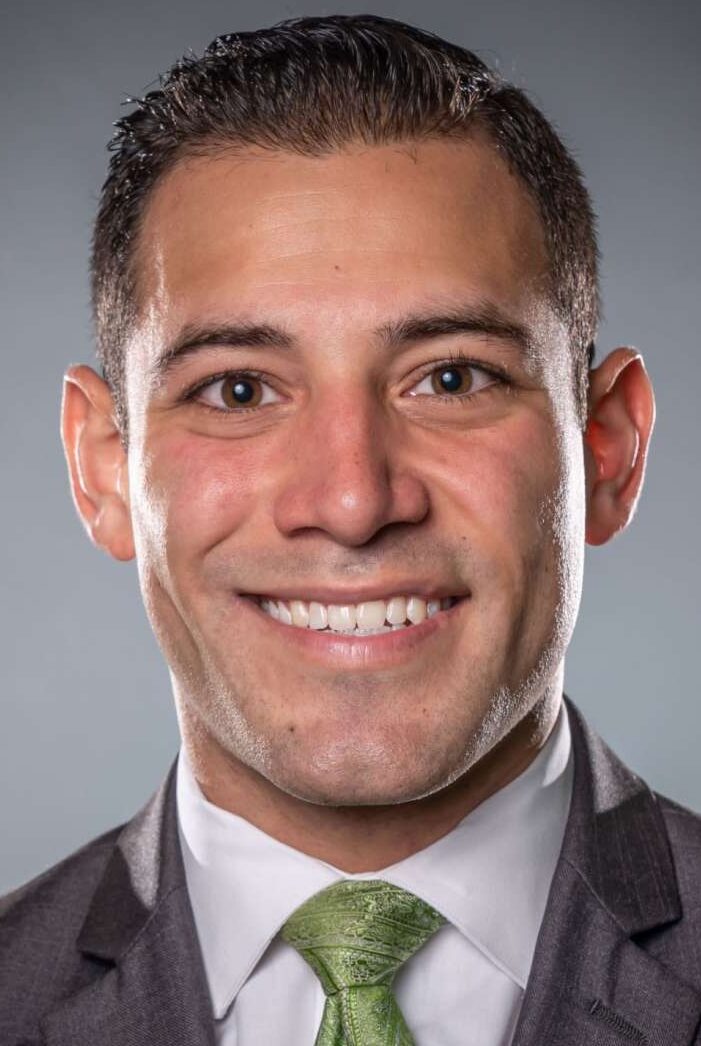 “The Barajas name is back in San Antonio TV news,” Candice Avila-Garcia reported Wednesday for mysanantonio.com. “John Paul Barajas (pictured) joined KSAT last week. Yes, he is related to Bill and Erik Barajas, both who graced the KSAT newsroom. Bill is his brother and Erik is his cousin. Both now work at TV stations in Houston. . . . The journalism family tree may have started with Bill and John Paul’s father Mike Barajas, a former Houston anchor, who signed off the air in 2011. . . .”
“The Barajas name is back in San Antonio TV news,” Candice Avila-Garcia reported Wednesday for mysanantonio.com. “John Paul Barajas (pictured) joined KSAT last week. Yes, he is related to Bill and Erik Barajas, both who graced the KSAT newsroom. Bill is his brother and Erik is his cousin. Both now work at TV stations in Houston. . . . The journalism family tree may have started with Bill and John Paul’s father Mike Barajas, a former Houston anchor, who signed off the air in 2011. . . .”
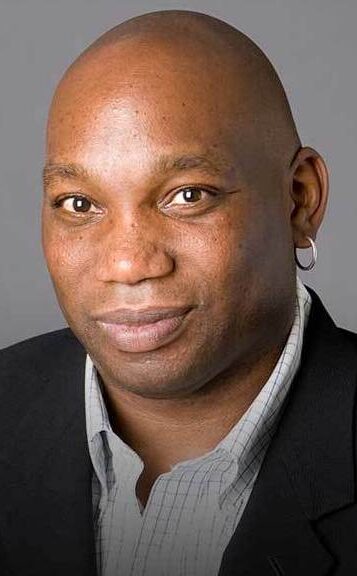 “Another ESPN voice is choosing Miami over Bristol,” Barrett Sports Media reported June 14. “Howard Bryant (pictured) is the latest to join Dan Le Batard and John Skipper at Meadowlark Media. Bryant had been a versatile voice in Bristol, appearing on both TV and radio programs offering commentary.” The report also said, “Bryant is a three-time National Magazine Award nominee. He has written for Oakland Tribune, San Jose Mercury News, Bergen Record, Boston Herald, and The Washington Post. He is also one of the great baseball historians, having written five books about the sport. Bryant’s next major project is a biography of Ricky Henderson due out soon.”
“Another ESPN voice is choosing Miami over Bristol,” Barrett Sports Media reported June 14. “Howard Bryant (pictured) is the latest to join Dan Le Batard and John Skipper at Meadowlark Media. Bryant had been a versatile voice in Bristol, appearing on both TV and radio programs offering commentary.” The report also said, “Bryant is a three-time National Magazine Award nominee. He has written for Oakland Tribune, San Jose Mercury News, Bergen Record, Boston Herald, and The Washington Post. He is also one of the great baseball historians, having written five books about the sport. Bryant’s next major project is a biography of Ricky Henderson due out soon.”
 “Ayesha K. Faines (pictured) — a journalist, panelist on The Grapevine and founder of Women Love Power — died on Friday from unknown causes at age 35,” Naledi Ushe reported Wednesday for People. “Faines’ death happened “unexpectedly,” Jacksonville TV station WJXT reported. The journalist used to work as a traffic anchor for the television outlet. . . .”
“Ayesha K. Faines (pictured) — a journalist, panelist on The Grapevine and founder of Women Love Power — died on Friday from unknown causes at age 35,” Naledi Ushe reported Wednesday for People. “Faines’ death happened “unexpectedly,” Jacksonville TV station WJXT reported. The journalist used to work as a traffic anchor for the television outlet. . . .”
 “Joanna Hernandez, a Chicago native and Columbia College graduate, has returned home to join WTTW-Channel 11 as an on-air reporter for ‘Chicago Tonight,’” Robert Feder reported Wednesday for his website on Chicago television news. “Like other news organizations WTTW has been striving to achieve diversity goals in hiring. The station’s Hispanic profile took a hit last week with the semi-retirement of host Phil Ponce, who ended his regular appearances on ‘Chicago Tonight’ after nearly three decades. Other prominent Hispanic journalists who’ve left the station were news director Hugo Balta, who was forced out earlier this year over his use of social media to express personal views, and ‘Chicago Tonight’ host and correspondent Eddie Arruza, who stepped down in 2019.
“Joanna Hernandez, a Chicago native and Columbia College graduate, has returned home to join WTTW-Channel 11 as an on-air reporter for ‘Chicago Tonight,’” Robert Feder reported Wednesday for his website on Chicago television news. “Like other news organizations WTTW has been striving to achieve diversity goals in hiring. The station’s Hispanic profile took a hit last week with the semi-retirement of host Phil Ponce, who ended his regular appearances on ‘Chicago Tonight’ after nearly three decades. Other prominent Hispanic journalists who’ve left the station were news director Hugo Balta, who was forced out earlier this year over his use of social media to express personal views, and ‘Chicago Tonight’ host and correspondent Eddie Arruza, who stepped down in 2019.
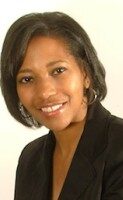 Carla Wills (pictured), who covered issues of climate change and environmental justice as a producer for “Democracy Now!,” has joined National Geographic as manager of audio and senior producer of the “Overheard at National Geographic” podcast. Davar Ardalan, National Geographic’s executive producer of audio, messaged Journal-isms Thursday that as “part of our commitment to making future audio frontiers at Nat Geo inclusive,” she, editor in chief Susan Goldberg and Whitney Johnson, director of visuals and immersive experiences, recruited Wills as well as Eli Chen , senior editor of “Overheard.” “The three of us have committed to featuring more and more Nat Geo global explorers.”
Carla Wills (pictured), who covered issues of climate change and environmental justice as a producer for “Democracy Now!,” has joined National Geographic as manager of audio and senior producer of the “Overheard at National Geographic” podcast. Davar Ardalan, National Geographic’s executive producer of audio, messaged Journal-isms Thursday that as “part of our commitment to making future audio frontiers at Nat Geo inclusive,” she, editor in chief Susan Goldberg and Whitney Johnson, director of visuals and immersive experiences, recruited Wills as well as Eli Chen , senior editor of “Overheard.” “The three of us have committed to featuring more and more Nat Geo global explorers.”
- “For the next year, The Inquirer will explore some of the institutions that formed the cornerstones of our democracy and society, linking them directly to ongoing harm against Philadelphians living today,” Errin Haines, a contributing editor for the Philadelphia Inquirer project “A More Perfect Union,” wrote July 4. “Joining me in this ambitious work will be journalists from inside and outside of the Inquirer newsroom and others committed to a clear-eyed look at these institutions and their impact.”
#Houston is widely considered America’s most diverse city…and the TV news market reflects that more than ever. I gathered some of the new broadcast media fam for brunch. Welcome to ??y’all! @NABJ @HoustonABJ pic.twitter.com/SVz8ECXHY5
— Jonathan Martin Fox26 (@JMartinTV) June 28, 2021
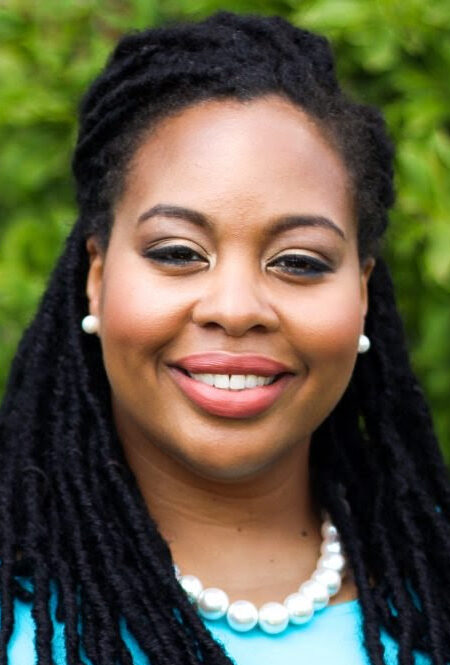 “NBC-owned WMAQ-Channel 5 has hired Akemi Harrison (pictured) as assistant news director. She currently holds the same position at WVIT, the NBC-owned station in West Hartford, Connecticut,” Robert Feder reported Tuesday for his website on Chicago television news.
“NBC-owned WMAQ-Channel 5 has hired Akemi Harrison (pictured) as assistant news director. She currently holds the same position at WVIT, the NBC-owned station in West Hartford, Connecticut,” Robert Feder reported Tuesday for his website on Chicago television news.
- The arrival of Kim Godwin as president of ABC News was a precipitating factor in the departure of Meghan McCain from The View, Carlos Greer reported Monday for the New York Post’s Page Six. “Sources told Page Six that [Whoopi] Goldberg, [Ana] Navarro and Joy Behar all voiced that they no longer wanted to work with McCain. One source said, ‘It happened as soon as [new ABC News president] Kim [Godwin] came in. It was right after Joy and Meghan’s huge [on-air] blow up [in May] where the network called an emergency meeting. They told new management, ‘We don’t want to work with her anymore.’”
- “Apple is developing a series about Negro League Baseball and Satchel Paige, with Magic Johnson on board as a producer,” Tim Baysinger reported June 29 for The Wrap. “The project is based on Donald Spivey’s book, ‘If Only You Were White: The Life of Leroy “Satchel” Paige.’ It will explore the years of the Negro Baseball League, an all-Black league that played during the segregation era before Jackie Robinson broke the color barrier in 1947.”
 “People often write to me online,” Zainab Iqbal wrote for The Collective, “Poynter’s newsletter by journalists of color for journalists of color and our allies.” “Sometimes they send an email. They DM me. They comment under my article on Facebook. ‘Anti-Semite.’ ‘Terrorist.’ This is nothing new, and thousands of Muslims experience the same thing. Other Muslim women journalists experience this, too. . . .I’ve learned that if we experience these things, we should tell our editors. Or our friends. Or our colleagues. And if and when we are comfortable, we can call them out. Of course, lots of women journalists face harassment from sources and colleagues. But Muslim women journalists also face harassment from the very community we are a part of. . . .”
“People often write to me online,” Zainab Iqbal wrote for The Collective, “Poynter’s newsletter by journalists of color for journalists of color and our allies.” “Sometimes they send an email. They DM me. They comment under my article on Facebook. ‘Anti-Semite.’ ‘Terrorist.’ This is nothing new, and thousands of Muslims experience the same thing. Other Muslim women journalists experience this, too. . . .I’ve learned that if we experience these things, we should tell our editors. Or our friends. Or our colleagues. And if and when we are comfortable, we can call them out. Of course, lots of women journalists face harassment from sources and colleagues. But Muslim women journalists also face harassment from the very community we are a part of. . . .”
- “The highest-quality types of news coverage are increasingly ‘about elites, for elites,’ and everyone suffers as a result,” Brian Stelter wrote Thursday in his “Reliable Sources” newsletter for CNN. “That’s one of the arguments in professor Nikki Usher’s new book ‘News for the Rich, White, and Blue: How Place and Power Distort American Journalism.’ Furthermore, she says, ‘institutional journalism is a White institution. And when audiences are imagined, especially those paying audiences, those audiences are imagined as White.’ . . . .”
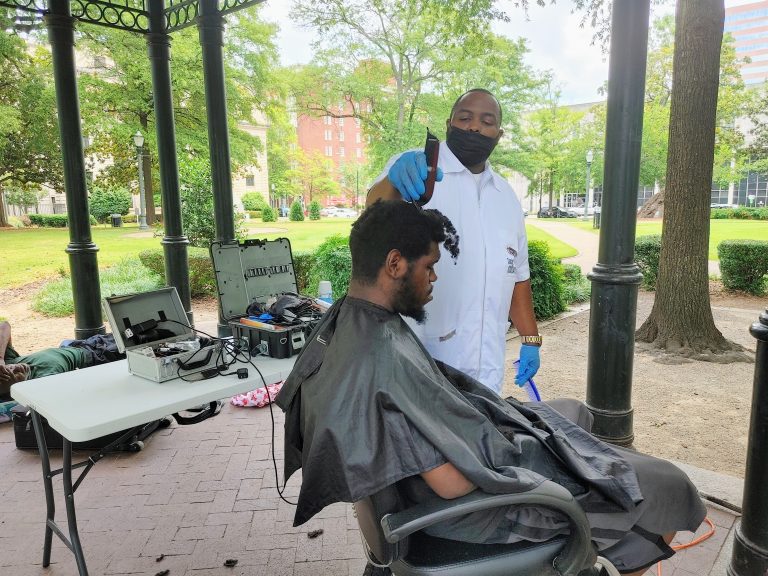
- The National Hispanic Public Relations Association has named anchor, producer and journalist Maria Hinojosa and iHeart President and Chief Creative Officer Enrique Santos as its recipients for 2021 ¡Bravo! Journalist of the Year and President’s Award, respectively, it announced June 30.
- Students at Brigham Young University are forbidden to report in the student newspaper “anything that’s critical of the school or The Church of Jesus Christ of Latter-day Saints, which owns it. That includes any mention of the faith’s past support for polygamy or segregation that ‘could cause embarrassment’ now,” Courtney Tanner reported June 28 for the Salt Lake Tribune. So they have started an underground paper called Prodigal Press. Helaman Sanchez, a graduate, wrote a piece for Prodigal Press about how the leadership of the LDS Church has said it supports Black Lives Matter but hasn’t taken action that ‘would make a real difference.’ He waited to publish until his diploma was in hand. . . . frustrated by his experience in the faith and on campus where he was often told to ‘go back to Africa’ or had people shout ‘White Lives Matter’ at him. . . .”
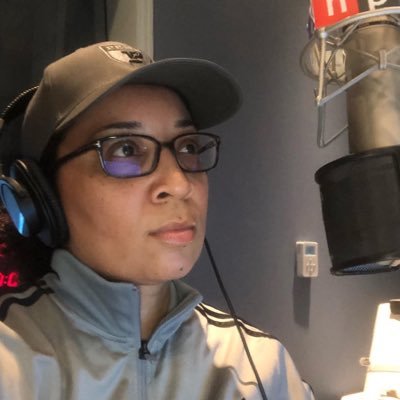 “NBC News has named Nicole Childers (pictured) Executive Editor for its Business, Tech & Media Unit,” A.J. Katz reported Friday for TV Newser. “Childers steps into the role beginning July 26, and will be based out of L.A. . . . Childers joins NBC News from Marketplace, where she served as Executive Producer of the Marketplace Morning Report. She also conceived of and launched a daily international business broadcast with the BBC, and began her career in broadcast news at ABC News as an intern for Diane Sawyer and rose up the ranks, including landing a producing gig in ABC’s business unit, before joining World News Tonight with Peter Jennings. . . .”
“NBC News has named Nicole Childers (pictured) Executive Editor for its Business, Tech & Media Unit,” A.J. Katz reported Friday for TV Newser. “Childers steps into the role beginning July 26, and will be based out of L.A. . . . Childers joins NBC News from Marketplace, where she served as Executive Producer of the Marketplace Morning Report. She also conceived of and launched a daily international business broadcast with the BBC, and began her career in broadcast news at ABC News as an intern for Diane Sawyer and rose up the ranks, including landing a producing gig in ABC’s business unit, before joining World News Tonight with Peter Jennings. . . .”
- In commemorating the Freedom Forum’s 30th anniversary, Gene Policinski, Freedom Forum Senior Fellow for the First Amendment, wrote June 30, “Our nation has been here before. In the early years of the republic, some First Amendment freedoms were enforcibly denied to women and people of color. The introduction of new technologies — from mass circulation newspapers to radio, TV and the internet — has produced fearful reactions over how the ‘new’ would and did change society. The inherent conflict produced by the protection of fringe and extreme beliefs, faiths and opinions is not new, but the First Amendment is up to the task. The Freedom Forum’s next focus is to ensure a growing number of Americans grasp the 21st century relevance and importance of the First Amendment.”
- “Six short films that premiered at the AFI Docs Film Festival last week are the culmination of a new initiative to connect Black, Indigenous and people of color filmmakers living in the American South and U.S. Territories with public media stations,” Kayla Benjamin reported June 29 for Current. “The Hindsight Project aimed to support BIPOC [Black, Indigenous, People of Color] filmmakers in developing relationships with PBS stations while telling community-focused stories.”
- In Ecuador, “Journalist Jhony Urgiles and cameraman Diego Vélez were broadcasting live the newscast of the digital media outlet DulzuraTV on June 28 when they were assaulted and verbally and physically attacked by two individuals who entered the channel’s facilities in the province of Cañar, in the Ecuadorian sierra,” the LatAm Journalism Review reported Monday from the Argentine news website Infobae.
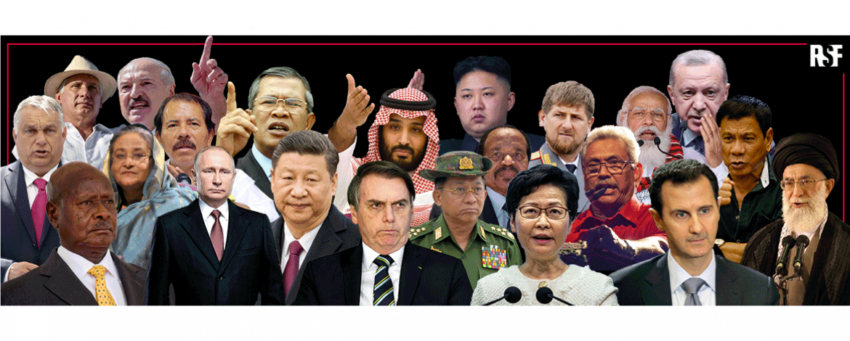
- “Reporters in local and regional dailies across India have been finding ways to report on the death and devastation of the second wave of the coronavirus, despite government intransigence,” Bhavya Dore reported June 28 for the Global Investigative Journalism Network. “The press in Prime Minister Narendra Modi’s home state of Gujarat has been particularly relentless in counting the dead, reporting from hospitals, morgues, and crematoria, finding creative ways to tell the story of how the state government has downplayed the severity of COVID-19. And while these stories were predominantly written for a local audience, they have sent ripples around the country as they are read by audiences far beyond the state. . . .”
- Soulaimane Raissouni, a Moroccan newspaper editor, “is one of at least 10 Moroccan journalists who have been jailed in recent years, most of them accused of sex crimes and other acts deemed illegal in Morocco, including certain forms of abortion,” Nicholas Casey and Aida Alami reported Saturday for The New York Times. “Rights groups say the cases are being pursued by authorities whose true aim is to silence the country’s small cadre of independent journalists with false and politically motivated accusations. . . .”
- “One year after taking effect, China’s National Security Law for Hong Kong has confirmed analysts’ worst fears,” Sasha Schroeder the International Press Institute staff wrote June 30. “The law criminalizes acts of secession, subversion, terrorism, and collusion with foreign or external forces – but what constitutes such acts is vaguely defined, effectively granting authorities a free hand to punish those who don’t toe Beijing’s line. . . .”
- “A training on Lesbian, Gay, Bisexual, Transgender, and Queer (LGBTQ) reporting, aimed at familiarising journalists and reporters with different writing techniques to ensure a fair, accurate, and inclusive reporting of LGBTQ stories and related issues, was held yesterday, at the Media Trust in Port-Louis,” the government of Mauritius reported June 29. “Representatives of various local media houses attended the one-day training funded by the European Union. This initiative was a joint collaboration of the Young Queer Alliance(YQA), the Collectif Arc-en-Ciel (CAEC), and the Media Trust. . . .”
- “Women working in African media were twice as likely to experience sexual harassment at work than men, according to a new report by Women in News, a media development program by the World Association of News Publishers (WAN-IFRA),” Hanaa’ Tamez reported Thursday for Nieman Lab. “The study is the first large-scale data collection on sexual harassment in African media. . . . Women in News surveyed journalists in Botswana, Kenya, Malawi, Rwanda, Tanzania, Uganda, Zambia, and Zimbabwe between July and November 2020. . . .”
To subscribe at no cost, please send an email to journal-isms+subscribe@groups.io and say who you are.
Facebook users: “Like” “Richard Prince’s Journal-isms” on Facebook.
Follow Richard Prince on Twitter @princeeditor
Richard Prince’s Journal-isms originates from Washington. It began in print before most of us knew what the internet was, and it would like to be referred to as a “column.” Any views expressed in the column are those of the person or organization quoted and not those of any other entity. Send tips, comments and concerns to Richard Prince at journal-isms+owner@
View previous columns (after Feb. 13, 2016).
View previous columns (before Feb. 13, 2016)
- Diversity’s Greatest Hits, 2018 (Jan. 4, 2019)
- Book Notes: Is Taking a Knee Really All That? (Dec. 20, 2018)
- Book Notes: Challenging ’45’ and Proudly Telling the Story (Dec. 18, 2018)
- Book Notes: Get Down With the Legends! (Dec. 11, 2018)
- Journalist Richard Prince w/Joe Madison (Sirius XM, April 18, 2018) (podcast)
- Richard Prince (journalist) (Wikipedia entry)
- February 2018 Podcast: Richard “Dick” Prince on the need for newsroom diversity (Gabriel Greschler, Student Press Law Center, Feb. 26, 2018)
- Diversity’s Greatest Hits, 2017 — Where Will They Take Us in the Year Ahead?
- Book Notes: Best Sellers, Uncovered Treasures, Overlooked History (Dec. 19, 2017)
- An advocate for diversity in the media is still pressing for representation, (Courtland Milloy, Washington Post, Nov. 28, 2017)
- Morgan Global Journalism Review: Journal-isms Journeys On (Aug. 31, 2017)
- Diversity’s Greatest Hits, 2016
- Book Notes: 16 Writers Dish About ‘Chelle,’ the First Lady
- Book Notes: From Coretta to Barack, and in Search of the Godfather
- Journal-isms’ Richard Prince Wants Your Ideas (FishbowlDC, Feb. 26, 2016)
- “JOURNAL-ISMS” IS LATEST TO BEAR BRUNT OF INDUSTRY’S ECONOMIC WOES (Feb. 19, 2016)
- Richard Prince with Charlayne Hunter-Gault,“PBS NewsHour,” “What stagnant diversity means for America’s newsrooms” (Dec. 15, 2015)
- Book Notes: Journalists Follow Their Passions
- Book Notes: Journalists Who Rocked Their World
- Book Notes: Hands Up! Read This!
- Book Notes: New Cosby Bio Looks Like a Best-Seller
- Journo-diversity advocate turns attention to Ezra Klein project (Erik Wemple, Washington Post, March 5, 2014)
When you shop @AmazonSmile, Amazon will make a donation to Journal-Isms Inc. https://t.co/OFkE3Gu0eK
— Richard Prince (@princeeditor) March 16, 2018

